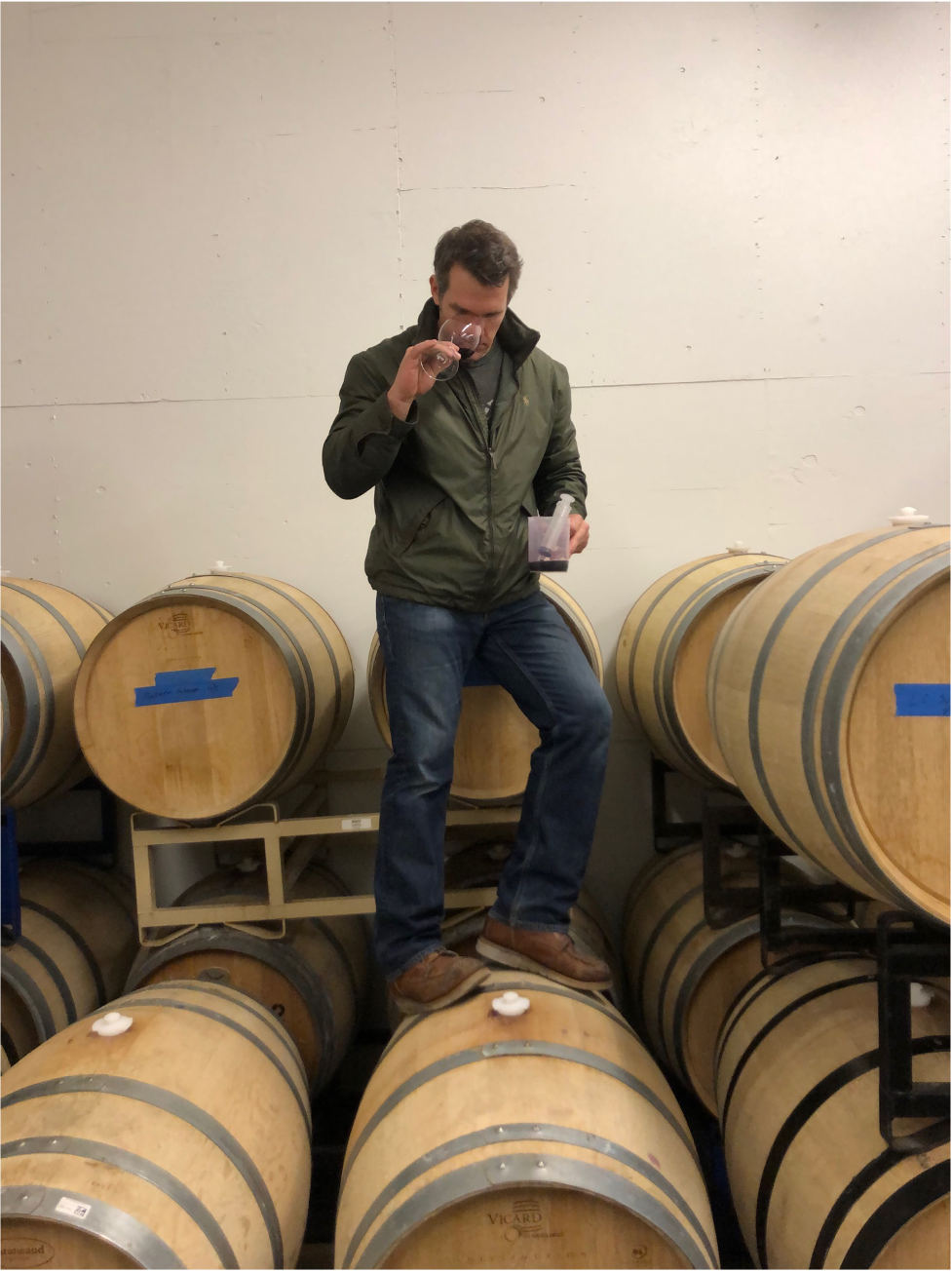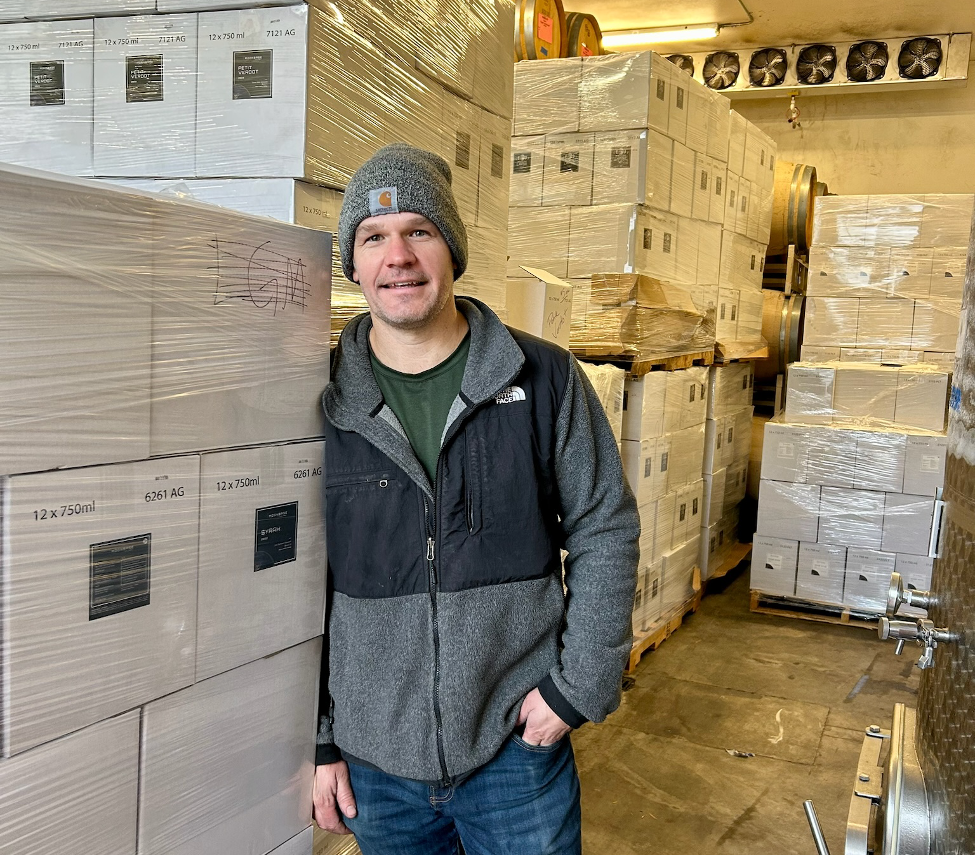Can you please update me on some basic information: date of EV graduation, current employer and position?
I graduated from the EV program in June of 2019. I currently run my own winery, Moonbase Cellars. My title is Owner/Winemaker.
How did you get into wine?
My wife and I got into wine after we got married in 2013. We didn’t have kids at the time and we lived in St. Louis and it was a fun way to travel and explore new wine regions. We took a trip to Walla Walla and loved the town and the area. Then, we decided to quit our jobs and move to Walla Walla with the hopes of opening our own winery.

Is there someone in the EV world that you admire, including fellow EV alums?
I really liked learning from Tim Donahue, the director when I graduated. He had a great way of teaching and so much wine knowledge. I also look up to Rich Funk and Tom Adolfea (EV Alum). Rich is the Owner/Head Winemaker for Saviah Cellars and Tom is the Production Winemaker. They are a good team – they both work hard and have lots of knowledge and experience.
What’s special to you about working in the wine industry?
I think you are creating something that people consume and enjoy. If you’re an accountant, you aren’t creating something that people get excited over (no offense to accountants). Whenever you meet people and tell them you are in the wine industry, they usually are very interested and want to talk about what you do.
What is your favorite part of the job?
I really like running a business. I knew I always wanted to try and run my own business, but I enjoy looking at reports, formulating projections and goals, negotiating costs, building a team, finding new suppliers, and trying new things without having to “ask” anyone.
I do enjoy making wine, but I’m glad harvest only lasts 6-8 weeks. If it was Harvest 24/ 7/ 365, I’m not sure I’d get as excited as I do for it.
I also like how my job changes throughout the year. I find myself staying busy all the time, but it is always something different. During harvest I’m sampling grapes and making wine, then switching gears to planning and getting everything prepped for bottling and making sure supplies are ordered. Then, I became a graphic designer working on the new Wine Club insert…it just goes on and on.
What are some of the challenges you’ve faced in the industry?
Oh wow, where to begin. It seems like there’s always something and there are always issues. However, I think that is true of any industry. I used to work in the grocery industry and the same thing – there’s always something going wrong or something that needs to be addressed. Although I think when you’re dealing with wine, you’re constantly worrying about the weather, the supply chain, sales, tourism, etc.
For me starting something from the ground up, it is extremely difficult to make the leap to the next level of having my own facility and vineyard. Currently, I still use Saviah’s equipment and facility to make my wine. If you have millions of dollars it is easy, but when you start from the bottom it is tricky to make that jump. I just always tell myself that I need to do everything in my power to be better than the “big boys”.
What do you think differentiates and excites you about Washington wine?
I’ve never made wine or worked in a different wine region, but I do feel in Washington some costs aren’t astronomical, which allows us to make world-class wine without the extreme price tag. In saying that, this also allows a lot of experimentation and pushing the boundaries. In other areas, this may not be possible because the costs are too high to take risks or experiment.
How do you foresee climate change or social issues affecting the local industry in the next few years?
It does seem like every year there is some challenging climate issue:
2019 – early frost
2020 – lots of smoke mid-September
2021 – extremely hot year and extremely low tonnage
2022 – extremely cold year
2023 – hot again, with lots of rain during October
2024 – extreme cold (-8 in some places for 36 hours)
It seems like we’re resilient enough to handle 1 climate issue per vintage, but I don’t know if we can handle 2, 3, or 4 issues. I think ultimately what will happen is that costs will continue to rise because of these climate issues, which may make it impossible for some business models.
What are some up-and-coming trends in wine that you are following?
I try and pay attention to the trends and not the fads. Personally, I’m not sure wine in a can is a smart move for a strong brand. I think there is a market, but it can hurt a strong brands image very quickly. I continue to see demand for the varietals that have medium popularity. What I mean is that everyone has a Cab, Merlot, Syrah, and Chardonnay; I think of those as high-popularity varietals. However, things like Grenache, Tempranillo, Carménère, and Mourvèdre tend to have some following. To the average wine drinker, those varietals aren’t all that common. I haven’t seen much demand for the low-popularity varietals. Grapes that are quite obscure – Gamay, Picpoul, Arneis, etc. I have nothing against those wines, I just don’t see much growth happening there anytime soon.
What advice can you share with future EV graduates?
A few things I would tell students. The first one is probably simple, but effective: work hard. The wine industry is fun, but lots of hard work. No matter what you do after graduation, if you work hard, you’ll be successful.
I would also tell students to learn as much as they can and to ask as many questions as possible, not only to your instructors but also to people in the Walla Walla wine community. This wine area is extremely open and willing to share. When I was a student, I would email winemakers and owners and try to meet for coffee just to ask them questions.
Also, if the opportunity presents itself, I would say travel and work in different wine regions. My plan didn’t include that, but I would have loved to work in Italy, South Africa, or Chile. If your situation allows for some travel, I would do it!
Lastly, I would encourage everyone to learn as much about the business side of a winery or vineyard as possible. This includes fixed and variable costs, marketing, financial statements, interest rates, cash flow, etc. No matter what role you find yourself in after graduation, the business side will always impact your role/job. I studied business as an undergrad in 2010, so my brain always goes there first – maybe as a downfall. I hear about a cool new vineyard with new varietals, and I first think okay, how much does a ton cost, do I have that in my budget, is there demand for that wine, can I sell it to wine club members, would that wine fit into a bottle that I already order, would it be under cork or screwcap, etc. etc. I’m very business-centric, but again I think no matter what you do, a solid business background is extremely useful.


Join the Conversation